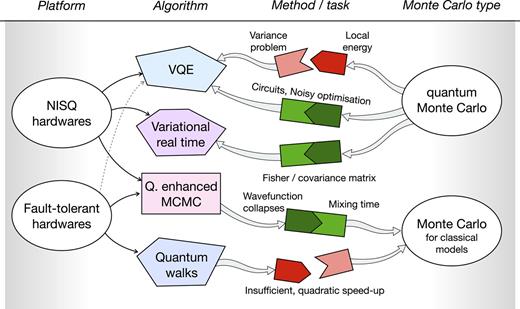In a research article published on January 2, 2024, Guglielmo Mazzola from the Institute for Computational Science at the University of Zurich explores the overlaps between quantum algorithms and Monte Carlo methods in physics and chemistry. The paper discusses the challenges and possibilities of integrating quantum Monte Carlo solutions into quantum algorithms, including energy estimators, parameter optimization, and variational circuits. The review also explores new ideas for using quantum hardware to accelerate sampling in statistical classical models, with applications in physics, chemistry, optimization, and machine learning. The research aims to foster further algorithmic developments at the intersection of quantum computing and Monte Carlo methods.
Quantum Computing and Monte Carlo Methods in Physics and Chemistry
Guglielmo Mazzola, from the Institute for Computational Science at the University of Zurich, has published a perspective on the overlaps between quantum algorithms and Monte Carlo methods in the domains of physics and chemistry. The paper discusses the challenges and possibilities of integrating established quantum Monte Carlo solutions into quantum algorithms. These include refined energy estimators, parameter optimization, real and imaginary-time dynamics, and variational circuits.
Quantum Computing’s Rapid Growth
The paper highlights the rapid growth in the field of quantum computing, with most of the works discussed having emerged within the last two years. This indicates a rapidly growing interest in this promising area of research. The paper also discusses the points of contact between quantum computing and Monte Carlo methods, including common themes such as shot noise arising from the measurements of the quantum register and the statistical root of Monte Carlo.
Quantum Computing and Monte Carlo: Challenges and Opportunities
One of the major issues for near-term simulations in a variational setting is the existence of shot noise, which implies a problematically large number of circuit repetitions. However, such uncorrelated wave function collapses can have computational value if used as important sampling in Monte Carlo. The paper also discusses attempts at cross-fertilization between the two fields in designing variational Ansätze and optimization methods for ground-state and dynamical problems.
Quantum Computing’s Potential for Monte Carlo Experts
The perspective aims to be an accessible presentation of the potential and limitations of quantum computing for Monte Carlo experts and more broadly computational physicists. It is timely as the first steps toward fault-tolerant hardware have been made, and experiments at the threshold of quantum advantage for quantum dynamics are now possible given the existence of 100 qubits of hardware, albeit noisy.
Quantum Computing and Monte Carlo: Future Directions
The paper observes the emergence of a new class of hybrid quantum algorithms revisiting classical and quantum Monte Carlo, opening completely new possibilities for quantum advantage in these areas. It reports about 20 recent works that aim to complement quantum computing and Monte Carlo in several subfields: hybrid quantum computing, quantum Monte Carlo, variational circuit development, parameter optimization, time-dependent simulations, and classical sampling.
Quantum Computing’s Hardware and Fundamental Limitations
The types of quantum hardware and their fundamental limitations, namely the hardware errors in the Noisy Intermediate Scale Quantum (NISQ) regime and the fairly long gate time of future error-corrected machines, are briefly mentioned. The paper also introduces general quantum algorithms for physics and the requirements for quantum advantage.
Quantum Computing’s Role in Physics and Chemistry
The paper discusses the variational method, the simplest kind of algorithm for physics and chemistry, and its limitations due to the shot noise. It also describes how the same calculation could be performed in the fault-tolerant era. The more technical section introduces the local energy estimator that is central in quantum Monte Carlo and explains why these algorithms, while still being stochastic, do not suffer from the severe variance problem of variational quantum algorithms.
Quantum Computing’s Impact on Classical Sampling
Finally, the paper discusses quantum computing methods to speed up classical sampling using digital machines, quantum simulators, and annealers. The concept map of the Perspective is shown, indicating the main links between quantum algorithms and Monte Carlo methods.
The article titled “Quantum computing for chemistry and physics applications from a Monte Carlo perspective” was authored by Guglielmo Mazzola and published in The Journal of Chemical Physics on January 2, 2024. The article can be accessed through the DOI link https://doi.org/10.1063/5.0173591.

